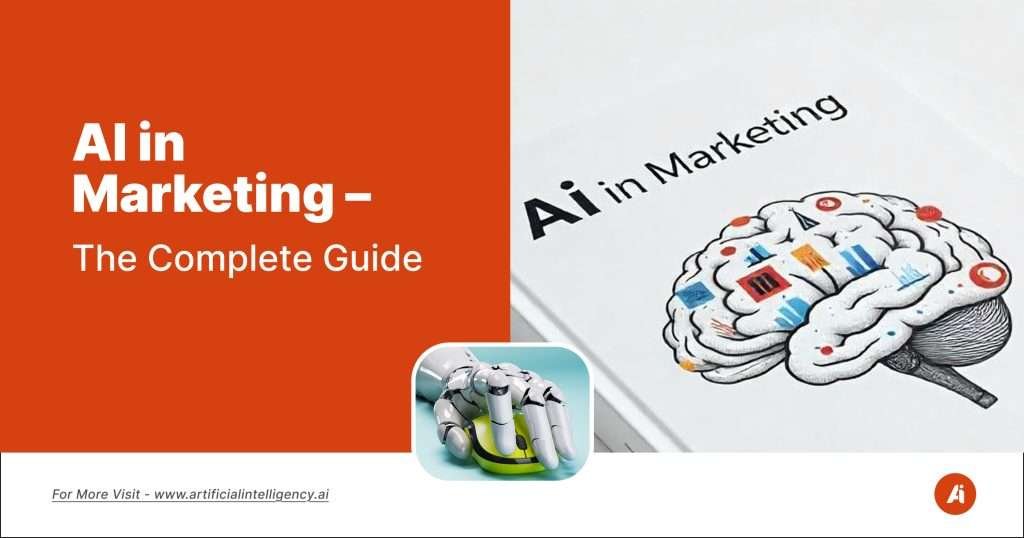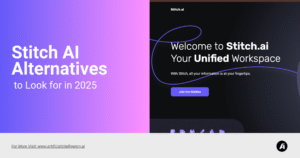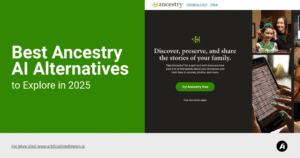Artificial intelligence in marketing is no longer a futuristic concept—it’s today’s reality. From enhancing digital marketing campaigns to creating personalized experiences, AI in marketing is reshaping how brands engage with audiences. Whether you’re a startup or an enterprise, integrating AI-powered marketing tools can transform your approach, boost efficiency, and increase your return on investment.
In this complete guide, we’ll explore the rise of AI in content marketing, its impact on customer experience, and how AI for SEO optimization and AI in social media marketing are creating smarter, more responsive campaigns. Let’s dive into the evolving world of AI-driven marketing strategies.
- What’s next for generative AI and marketing?
-
What are the benefits of AI marketing?
- 1. AI can help you attract and retain your customers
- 2. AI can use data analytics to uncover trends
- 3. AI understands business needs better with time
- 4. AI can improve your business efficiency
- 5. AI is adaptable to different customer demographics
- 6. AI can help you create compelling content
- 7. AI will improve your ROI
- How is artificial intelligence used in marketing?
- Which AI technologies enable marketing?
- What is the future of AI in marketing?
- Final Thoughts
What’s next for generative AI and marketing?
Generative AI has become one of the most influential developments in AI-powered marketing. With tools like ChatGPT, Jasper, and Midjourney, businesses are leveraging artificial intelligence in marketing to create copy, visuals, and even full ad campaigns faster than ever. As this technology evolves, so too does the sophistication of AI in content marketing.
In the coming years, expect generative AI for digital marketing to become more intuitive and tailored. Rather than simply generating ideas, future systems will be capable of analyzing brand voice and target audience behavior in real-time. This means that AI in personalized marketing will feel even more human, more emotional, and more engaging—bridging the gap between automation and authenticity.
As we move forward, AI for customer engagement will likely see a surge in voice-driven campaigns, predictive personalization, and real-time creative generation. The power of AI in social media marketing will also grow, allowing marketers to instantly adapt messaging based on trending content and audience reactions. The bottom line? AI in marketing is set to redefine creativity and strategy alike.
What are the benefits of AI marketing?
Implementing AI in marketing isn’t just a trend—it’s a strategic advantage. Below are the major benefits that AI-powered marketing brings to the table, from automation to personalization and everything in between.
1. AI can help you attract and retain your customers
One of the biggest advantages of AI in personalized marketing is its ability to analyze customer behavior in real-time. Using predictive algorithms and machine learning, businesses can identify potential buyers and serve them with highly relevant content. This level of targeting makes AI for customer engagement more effective and scalable.
For example, AI in content marketing enables brands to dynamically adjust messaging based on user interactions. The same customer who clicks on a blog might later see a personalized offer via email—thanks to the seamless flow enabled by AI in marketing. This creates a continuous, engaging user journey that fosters loyalty and retention.
2. AI can use data analytics to uncover trends
Harnessing big data is no longer optional—it’s essential. With AI-powered marketing, businesses can comb through massive datasets to identify trends, user preferences, and purchasing behaviors. This empowers brands to fine-tune campaigns and make data-driven decisions.
Using AI for SEO optimization, marketers can spot trending keywords, backlinks, and content opportunities. At the same time, AI in social media marketing reveals patterns in audience sentiment and engagement. The result? Smarter strategies and more relevant content built on insights, not guesswork.
Ultimately, these analytics make AI-driven marketing strategies more agile and responsive to market shifts, ensuring your brand stays ahead of the curve.
3. AI understands business needs better with time
A unique feature of artificial intelligence in marketing is its ability to learn. The more data it processes, the better it becomes at predicting outcomes and understanding what drives performance. Over time, AI for digital marketing doesn’t just follow your instructions—it anticipates them.
This evolving intelligence enhances AI in personalized marketing, tailoring messages with more accuracy the longer it interacts with your audience. It also allows AI in marketing platforms to recommend new strategies, segment audiences more precisely, and automate routine tasks with increasing precision.
In essence, AI-powered marketing becomes a collaborative partner that grows with your business—one that gets smarter, faster, and more intuitive every day.
4. AI can improve your business efficiency
Efficiency is at the heart of AI-driven marketing strategies. By automating repetitive tasks such as data entry, content generation, and campaign monitoring, AI for digital marketing frees up your team to focus on creativity and strategy.
From chatbots handling customer inquiries to AI in social media marketing managing posts and comments, the impact on productivity is undeniable. With AI in marketing, teams can execute multi-channel campaigns with fewer resources and less manual oversight.
Moreover, AI for SEO optimization can instantly audit websites, track rankings, and implement keyword strategies, all in real time. This allows your business to move faster while staying competitive and consistent.
5. AI is adaptable to different customer demographics
Different audiences require different messaging—and AI in personalized marketing excels at this. It can segment users based on behavior, location, preferences, and more, allowing brands to tailor messaging that resonates on a deeper level.
For example, AI in content marketing tools can generate blog posts or social media captions that vary in tone and style for Gen Z vs. Gen X. At the same time, AI in customer engagement adapts chatbot conversations based on age group, ensuring a natural and effective interaction.
This adaptability extends to AI for digital marketing platforms, which automatically adjust bidding strategies or campaign timing based on demographic engagement data. By doing so, AI-powered marketing ensures that every customer touchpoint feels relevant and timely.
6. AI can help you create compelling content
Compelling content is the backbone of digital marketing. With AI in content marketing, brands can produce blog posts, social media updates, video scripts, and email campaigns quickly and efficiently. Tools powered by artificial intelligence in marketing can generate ideas, edit drafts, and optimize for SEO—all in one workflow.
Even better, AI in marketing doesn’t just help create content—it also tests and refines it. Through A/B testing and real-time analytics, AI-powered marketing ensures that each piece of content performs better than the last.
7. AI will improve your ROI
At the end of the day, every marketer wants results. AI for digital marketing directly impacts return on investment by optimizing every part of the customer journey—from acquisition to retention. Smarter targeting, automated workflows, and predictive personalization all contribute to better outcomes.
Ultimately, AI-driven marketing strategies offer higher returns with less waste. That’s the promise of AI-powered marketing—not just doing things faster, but doing them better.
How is artificial intelligence used in marketing?
The application of artificial intelligence in marketing is transforming how businesses operate at every level. From creative tasks like content generation to analytical processes like competitive research, AI-powered marketing tools are becoming indispensable. Here’s a closer look at the key areas where AI in marketing is making a real impact today.
Social media listening
AI in social media marketing enables brands to go beyond likes and shares. Through social listening tools powered by artificial intelligence in marketing, businesses can monitor brand mentions, track sentiment, and identify emerging trends across platforms like X (formerly Twitter), Instagram, TikTok, and LinkedIn. By using AI for customer engagement, brands can respond quickly to both praise and criticism, creating stronger customer relationships. Real-time feedback gathered through social media listening also fuels more effective AI-driven marketing strategies by helping marketers tailor messaging and product development. In essence, AI in marketing empowers brands to truly “listen” to what customers are saying—and act on it instantly.
Content generation
One of the most popular applications of AI in content marketing is automated content creation. Tools like ChatGPT and Jasper use artificial intelligence in marketing to generate blog posts, social media captions, ad copy, and more—saving time and ensuring consistency in voice and messaging. Pairing AI for SEO optimization with content generation means businesses can produce high-ranking, keyword-optimized copy at scale. Whether it’s crafting personalized emails or designing scripts for videos, AI-powered marketing makes content creation faster and more strategic. For brands competing in crowded digital spaces, AI in marketing ensures their content stands out while also staying relevant and searchable.
Automation
Marketing automation has been revolutionized by AI-powered marketing platforms. From scheduling social posts to sending out emails based on user behavior, AI in digital marketing allows businesses to streamline processes and reduce manual labor. AI for customer engagement is especially powerful in automated chatbots and customer service tools, which can provide immediate responses, route inquiries, and collect data in real time. At the same time, AI in personalized marketing tools can automatically adjust ad spend or tailor recommendations based on individual behavior. Automation not only enhances productivity but also improves campaign outcomes, making AI in marketing a true operational powerhouse.
Audience segmentation and personalization
Effective marketing requires speaking directly to different customer needs—and AI in personalized marketing does exactly that. By analyzing behavior, demographics, and psychographics, AI-powered marketing tools segment audiences with incredible precision. These insights allow brands to deliver tailored messages across channels, improving conversions and loyalty. For example, AI in email campaigns can deliver custom subject lines, while AI in social media marketing adjusts tone and timing for each audience segment. In today’s competitive environment, AI in marketing ensures that every message feels one-on-one—even when it’s reaching thousands.
Data analysis for customer insights
Data is the fuel, and artificial intelligence in marketing is the engine. With AI-driven marketing strategies, brands can turn raw data into meaningful insights. Whether it’s customer behavior, buying habits, or engagement patterns, AI for digital marketing systems can uncover what matters most. By combining AI for SEO optimization and behavioral analytics, marketers can understand which content performs best, why users convert, and where friction exists in the sales funnel. This level of clarity informs better decisions, sharper messaging, and more impactful strategies. With AI in marketing, data isn’t just collected—it’s transformed into opportunity.
Reputation management
Managing brand reputation online is critical—and AI in marketing helps monitor and respond to feedback at scale. Through sentiment analysis and review tracking, AI in customer engagement tools identify emerging issues before they escalate. Whether it’s scanning forums, social platforms, or review sites, AI-powered marketing software ensures businesses stay proactive. Positive reviews can be amplified, while negative ones are flagged for resolution. Incorporating AI in social media marketing for reputation management not only safeguards your image but also strengthens brand trust and loyalty.
Competitive intelligence
To stay ahead, brands need to understand their competitors—and AI in marketing provides the tools to do just that. With artificial intelligence in marketing, you can track competitors’ ad strategies, content performance, pricing changes, and SEO rankings. Using AI for SEO optimization, businesses can uncover keyword gaps and backlink opportunities. Meanwhile, AI-driven marketing strategies analyze competitor campaigns to reveal what works—and what doesn’t. Competitive intelligence powered by AI in digital marketing gives businesses a strategic edge, allowing them to adapt faster and market smarter.
Multilingual advantage
Global marketing requires multilingual capabilities—and AI-powered marketing rises to the challenge. Advanced natural language processing allows businesses to create, translate, and localize content across dozens of languages quickly. AI in content marketing ensures that messaging maintains its tone, structure, and clarity in every language. At the same time, AI in personalized marketing tailors those messages to reflect cultural nuances and audience preferences. Whether you’re launching a global campaign or expanding into new regions, AI in marketing makes reaching international audiences not only possible but seamless.
Which AI technologies enable marketing?
The power of AI in marketing lies in the technologies that make it all possible. Today’s most advanced AI-powered marketing platforms rely on a mix of machine learning, natural language processing, and neural networks to automate and optimize campaigns. These innovations are the driving force behind AI-driven marketing strategies that are transforming how brands connect with their audiences. Let’s explore the core technologies behind artificial intelligence in marketing.
1. Machine learning
Machine learning is at the heart of most AI-powered marketing systems. It enables computers to learn from data without being explicitly programmed, allowing them to recognize patterns, predict behavior, and improve over time. In AI for digital marketing, machine learning is used to tailor product recommendations, optimize ads, and forecast campaign performance.
2. Natural language processing (NLP)
When used in AI in personalized marketing, NLP helps create messaging that feels more authentic and relevant to individual users. NLP also enhances AI for customer engagement through more intelligent chatbots and sentiment-aware responses. As the backbone of conversational AI in marketing, NLP is essential for delivering meaningful, human-like communication at scale.
3. Semantic search
Semantic search elevates AI for SEO optimization by focusing on the intent behind search queries rather than just keywords. It’s a key part of how AI in marketing understands what users are truly looking for. By interpreting context, relevance, and user behavior, AI-powered marketing tools can produce search results that better meet consumer needs.
4. Named entity recognition (NER) and neural networks
In AI-driven marketing strategies, NER and neural networks are used to segment audiences, personalize content, and extract insights from massive datasets. For example, in AI for customer engagement, neural networks can help predict churn and suggest personalized retention offers. As artificial intelligence in marketing becomes more sophisticated, these technologies will only grow in importance.
5. Sentiment analysis
Sentiment analysis detects emotions in customer feedback, social posts, and reviews, providing critical context in AI in social media marketing. Brands use it to gauge public perception and adjust messaging in real time. It’s also a valuable part of AI for customer engagement, allowing teams to prioritize responses and resolve issues faster.
What is the future of AI in marketing?
As AI in marketing continues to evolve, new technologies are shaping its future. These innovations are building more intuitive, ethical, and responsive systems. From image recognition to responsible AI policies, the future of AI-powered marketing looks promising—and it’s already here.
Computer vision
Computer vision gives AI in digital marketing the ability to “see” and interpret visual data. This means recognizing logos in social media posts, analyzing video performance, and even assessing user-generated content for branding opportunities. For AI in social media marketing, it means smarter ad placements and visual trend tracking.
AI chatbots
AI chatbots are one of the most direct applications of AI for customer engagement. They handle inquiries, provide recommendations, and assist with purchases—all while learning from every interaction. These chatbots rely on AI in personalized marketing to adapt conversations to each individual user.
Predictive and prescriptive AI
Predictive AI uses past behavior to forecast future actions, while prescriptive AI suggests specific next steps. Together, they form a cornerstone of AI-driven marketing strategies. Predictive analytics identifies trends, while prescriptive systems optimize responses across campaigns.
Responsible AI
The future of AI in marketing isn’t just about power—it’s also about ethics. Responsible AI ensures that algorithms are transparent, unbiased, and privacy-conscious. As AI-powered marketing grows more advanced, maintaining trust with consumers is critical.
Final Thoughts
The future of AI in marketing is dynamic, data-driven, and deeply human. With tools like AI for SEO optimization, AI in content marketing, and AI for customer engagement, businesses are connecting with audiences in ways never before possible. Whether it’s streamlining operations through AI-powered marketing or building long-term loyalty through AI in personalized marketing, the possibilities are limitless.
As technology continues to evolve, those who embrace AI in digital marketing and invest in AI-driven marketing strategies will lead the way. The intersection of creativity and data, powered by artificial intelligence in marketing, is redefining what’s possible—and the journey is just beginning.
Author
-
I’m an AI SaaS expert passionate about simplifying complex tech. I explore and review AI-powered products to help you make smarter decisions.
View all posts



